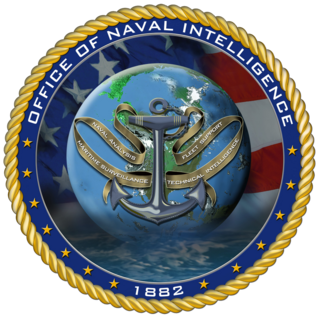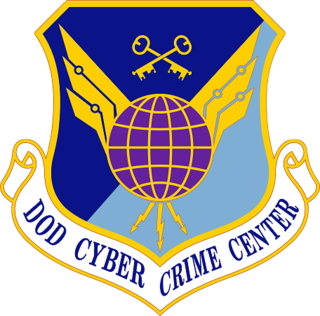
The Federal Bureau of Investigation (FBI) is the domestic intelligence and security service of the United States and its principal federal law enforcement agency. An agency of the United States Department of Justice, the FBI is a member of the U.S. Intelligence Community and reports to both the Attorney General and the Director of National Intelligence. A leading U.S. counterterrorism, counterintelligence, and criminal investigative organization, the FBI has jurisdiction over violations of more than 200 categories of federal crimes.

The United States Department of Homeland Security (DHS) is the U.S. federal executive department responsible for public security, roughly comparable to the interior or home ministries of other countries. Its stated missions involve anti-terrorism, border security, immigration and customs, cyber security, and disaster prevention and management.

The National Archives and Records Administration (NARA) is an independent agency of the United States government within the executive branch, charged with the preservation and documentation of government and historical records. It is also tasked with increasing public access to those documents that make up the National Archives. NARA is officially responsible for maintaining and publishing the legally authentic and authoritative copies of acts of Congress, presidential directives, and federal regulations. NARA also transmits votes of the Electoral College to Congress. It also examines Electoral College and constitutional amendment ratification documents for prima facie legal sufficiency and an authenticating signature.
U.S. Immigration and Customs Enforcement is a federal law enforcement agency under the U.S. Department of Homeland Security. ICE's stated mission is to protect the United States from cross-border crime and undocumented immigration that threaten national security and public safety.

Cybercrime encompasses a wide range of criminal activities that are carried out using digital devices and/or networks. These crimes involve the use of technology to commit fraud, identity theft, data breaches, computer viruses, scams, and expanded upon in other malicious acts. Cybercriminals exploit vulnerabilities in computer systems and networks to gain unauthorized access, steal sensitive information, disrupt services, and cause financial or reputational harm to individuals, organizations, and governments.

The Freedom of Information Act, 5 U.S.C. § 552, is the United States federal freedom of information law that requires the full or partial disclosure of previously unreleased or uncirculated information and documents controlled by the U.S. government upon request. The act defines agency records subject to disclosure, outlines mandatory disclosure procedures, and includes nine exemptions that define categories of information not subject to disclosure. The act was intended to make U.S. government agencies' functions more transparent so that the American public could more easily identify problems in government functioning and put pressure on Congress, agency officials, and the president to address them. The FOIA has been changed repeatedly by both the legislative and executive branches.

The National Personnel Records Center fire of 1973, also known as the 1973 National Archives fire, was a fire that occurred at the Military Personnel Records Center (MPRC) in the St. Louis suburb of Overland, Missouri, from July 12–16, 1973.

Suitland is a suburb of Washington, D.C., approximately one mile (1.6 km) southeast of Washington, D.C. Suitland is a census designated place (CDP), as of the 2020 census, its population was 25,839. Prior to 2010, it was part of the Suitland-Silver Hill census-designated place.

The National Security Archive is a 501(c)(3) non-governmental, non-profit research and archival institution located on the campus of the George Washington University in Washington, D.C. Founded in 1985 to check rising government secrecy. The National Security Archive is an investigative journalism center, open government advocate, international affairs research institute, and the largest repository of declassified U.S. documents outside the federal government. The National Security Archive has spurred the declassification of more than 15 million pages of government documents by being the leading non-profit user of the U.S. Freedom of Information Act (FOIA), filing a total of more than 70,000 FOIA and declassification requests in its over 35+ years of history.

The Office of Naval Intelligence (ONI) is the military intelligence agency of the United States Navy. Established in 1882 primarily to advance the Navy's modernization efforts, it is the oldest member of the U.S. Intelligence Community and serves as the nation's premier source of maritime intelligence.

The National Crime Information Center (NCIC) is the United States' central database for tracking crime-related information. The NCIC has been an information sharing tool since 1967. It is maintained by the Criminal Justice Information Services Division (CJIS) of the Federal Bureau of Investigation (FBI) and is interlinked with federal, tribal, state, and local agencies and offices.
The Nazi War Crimes and Japanese Imperial Government Records Interagency Working Group is a United States government interagency group, which is tasked with locating, identifying, inventorying, and recommending for declassification classified U.S. records relating to Nazi German and Imperial Japanese war crimes.
Suitland Manor is a neighborhood in the unincorporated community of Suitland in Prince George's County. It is located on the northern side of the intersection of Md. Rt 218 and Md. Rt 458. Directly across Suitland Road is the Suitland Federal Center, which is home to the national headquarters of the United States Census Bureau, as well as other government agencies. On June 29, 2006, the Redevelopment Authority of Prince George's County issued a Request for Proposals inviting developers to redevelop the property into a new residential-focused mixed-use, town center.

Transnational organized crime (TOC) is organized crime coordinated across national borders, involving groups or markets of individuals working in more than one country to plan and execute illegal business ventures. In order to achieve their goals, these criminal groups use systematic violence and corruption. Common transnational organized crimes include conveying drugs, conveying arms, trafficking for sex, toxic waste disposal, materials theft and poaching.
A government database collects information for various reasons, including climate monitoring, securities law compliance, geological surveys, patent applications and grants, surveillance, national security, border control, law enforcement, public health, voter registration, vehicle registration, social security, and statistics.

The Department of Defense Cyber Crime Center (DC3) is designated as a Federal Cyber Center by National Security Presidential Directive 54/Homeland Security Presidential Directive 23, as a Department of Defense (DoD) Center Of Excellence for Digital and Multimedia (D/MM) forensics by DoD Directive 5505.13E, and serves as the operational focal point for the Defense Industrial Base (DIB) Cybersecurity program. DC3 operates as a Field Operating Agency (FOA) under the Inspector General of the Department of the Air Force.
Tampering with evidence, or evidence tampering, is an act in which a person alters, conceals, falsifies, or destroys evidence with the intent to interfere with an investigation (usually) by a law-enforcement, governmental, or regulatory authority. It is a criminal offense in many jurisdictions.

The United States National Archives and Records Administration maintains facilities and buildings housing its records and services across the country. Within the organization of the National Archives, the upkeep of its facilities falls under the National Archives Facilities and Property Management Office.

The National Archives at College Park is a major facility of the National Archives and Records Administration of the United States which is located in College Park, Maryland. The facility serves as the primary base of operations for the bulk of the senior offices within the organization of the National Archives. The facility operates in tandem with the National Archives Building in Washington, D.C. which serves as the ceremonial headquarters of the National Archives in that this is where the Archivist of the United States maintains their primary office.
The 1978 Suitland National Archives Film Vault Fire was a fire at the National Archives and Records Administration Film Vault in Suitland, Maryland on December 7, 1978. The fire destroyed 12.6 million feet of Universal Pictures newsreel footage from 1929 to 1967, including film of the bombing of Pearl Harbor, other World War II combat footage and film from the time of The Great Depression.














